Sadiq Khan did not expect, or hope, to mark his first anniversary as mayor of London like this. It has been a shattering couple of months for the city: the terror attacks at Westminster Bridge, London Bridge and Finsbury Park mosque, followed by the fire at Grenfell Tower. “It’s been an awful time,” he says. “The worst weeks of my life, professionally, and I’ve had pretty tough times as a lawyer and an MP.”
He admits that, on occasion, he has struggled to know what to say by way of comfort, hope or explanation. “I thought long and hard before making a statement after the London Bridge terror attack. In the end, I said, ‘Not in my name’, because I don’t want anybody who is Muslim to think that somehow you are responsible, that you have to apologise for this. The response I received from fellow Muslims confirmed to me that my instinct was right.”
Khan has always been a fast talker. He says it was an imperative growing up as one of eight siblings and seven boys: “Speak fast or you don’t get heard.” These days the words tumble out so fast that they crash into each other, and some are simply dropped; it’s as if there just isn’t enough time for the mayor of London to formulate a full sentence.
He is political to the core – never off message, always to the point: a very different mayor from Boris Johnson. Johnson’s clownish bluster has been replaced by an intense seriousness and bee-like industry. Where Johnson would distract you with knockabout farce and Latin, Khan coshes you over the head with facts and data. Challenge him on housing or transport, and he’ll volley back any number of percentages to prove he’s doing a better job than his predecessor.
And the general consensus is that he is. Khan is not a man without ego, and never one to shy away from a photo opportunity; but you sense that while Johnson was largely championing Johnson, Khan is championing London. So he is determined to build more affordable housing, keep down the cost of public transport and make London greener. Fourteen months in, he is getting there – but not without the occasional hiccup, backtrack and accusation of hypocrisy.
I am shadowing Khan for a week. Just listening to his itinerary is exhausting, never mind keeping up with it. Take today: he got up at 6am, went for a five-mile run (six weeks after a hernia operation), had breakfast with his two teenage daughters, went to Kingston to discuss regeneration, met representatives from the struggling mini-cab trade, chaired a couple of meetings at City Hall, hooked up with the TfL commissioner, had a one-to-one with transport secretary Chris Grayling, is now spending an hour with me – and this evening he’s off to a cultural reception with London’s great and good. “Most days are like this,” he says. “The diversity is not just day to day, but hour to hour. I’ve been blessed – every job I’ve had I’ve loved, whether it’s as a lawyer, MP, cabinet minister… But I’m not going to pretend otherwise: I love this job more than any of them.”
Another day, another full itinerary. Today, Khan is appearing at an event with Rahm Emanuel, former chief of staff to President Obama and the current mayor of Chicago. If you wanted any evidence of the enhanced status of the modern mayor, this is it. The conference centre in the City of London is packed with academics, educators, blue-sky thinkers, tech gurus and entrepreneurs, hanging on to the mayors’ every word. At 46, Khan is the younger by 11 years, but they could be brothers: both are short, svelte, smartly suited, tie-less. Emanuel is Chicago’s first Jewish mayor, while Khan is London’s first Muslim mayor. The two perch themselves on stools, their legs dangling in midair. It could be humiliating, but Khan makes a joke about it: “If somebody can help me off the chair later, I’d be very grateful.”
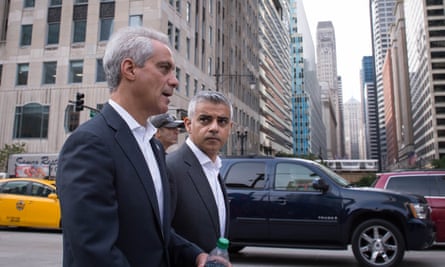
The mayors are here to boost business between their cities, though Emanuel is also here to support Khan and London in a time of crisis. Khan’s message is simple: despite everything, London is thriving. “This is the most diverse city in the world. More than 300 languages are spoken here. Rich, poor, whatever faith or ethnicity, London is your home.” Most importantly, London is open for business. In the past 12 months, Khan tells the audience, Apple, Google, Facebook and Snapchat have announced big investments in the city. He is in his element here: welcoming big business, triangulating and forging relationships. It’s ironic when you consider that Zac Goldsmith, his Conservative rival in last year’s mayoral election, waged a bitterly sectarian campaign against him, portraying Khan as an anti-business Corbynista and a dangerous radical who had shared a stage with Islamic extremists.
In his short time in office, Khan has come to seem a perfect figurehead for modern London. His story is the one that the city likes to tell of itself, even if he is the exception rather than the rule: the bus driver’s son made good; the teenager who might have become a professional sportsman (he had trials for Surrey cricket club); the trainee solicitor who saved for a house deposit by sleeping in a bunk bed at his parents’ house; the idealist who advocated for the needy and then gave up a thriving legal practice to stand as a Labour candidate; the MP who became a cabinet minister who became mayor, and who still lives in Tooting, south London, where he grew up. It’s an inspiring story, even if he does occasionally gild the lily.
Today, Khan tells his audience that real power now lies with city mayors rather than national politicians. “The 19th century was the century of empires, the 20th was the century of nation states, and the 21st is the century of cities and mayors.”
Afterwards, I ask him why. “We’re far more fleet-footed at doing stuff.” He can achieve more as a mayor than a minister? “Absolutely. If you’re in government, things take time to action. Let me give you an example that really affects people. So, air quality, right? The government knows there’s a problem with air quality, and I would say the government has done very little about it. They would say, ‘Well, we have, we’ve done A, B, C, D, E.’ But what’s been the positive impact of that? Answer: very little.”
This is Khan’s shtick: he posits a question, then he answers it for you. He continues. “As a mayor, what have we done over the past 14 months? First, you get the information out there, so we’ve published the air quality reports that Boris hid away. You educate London, in a non-patronising way, about what the air quality implications are: that more than 9,000 people die prematurely, that children have smaller lungs because of poor air quality. So we’re changing public opinion. And we have done something about it: introducing the cleanest buses on the worst routes, the T-charge from this October [a toxicity penalty for vehicles that fail to meet emissions standards], the world’s first ultra-low-emission zone from 2019. We’re working with councils to improve air around schools. Already, in 14 months, we’ve improved the air on Oxford Street. How? By getting rid of the most polluting buses.” He clicks his fingers triumphantly and comes to a rare pause.

There is one big difference between him and the most powerful American mayors: they have more money to play with and greater responsibilities. The mayor of New York, for example, spends 50% of the taxes raised there; Khan can spend 7%. (In Tokyo, the figure is 70%.) What does he think would be a fair amount? “I’d rather be nearer Tokyo, but I’d be happy with New York.” He smiles. A recent report suggested that the mayor should be able to spend 14% of London taxes. “That would be progress,” he says. “We are the most centralised democracy in the western world, and that has got to change.”
Have Labour politicians such as him and Andy Burnham chosen to be mayors because the role provides an alternative power base while Jeremy Corbyn leads the party? “No, that’s unfair,” he says. Khan was one of the 35 MPs who nominated Corbyn for the Labour leadership in 2015, winning him a place on the ballot, but he never voted for him and distanced himself from the Labour leader during his mayoral campaign. In August 2016, he wrote an article in the Observer pleading with the Labour party to ditch Corbyn “because Jeremy has failed to win the trust and respect of the British people”. In February, a YouGov poll suggested that Khan was best placed to replace Corbyn, when likability and recognisability factors were combined, and many political commentators assume that, ultimately, Khan is positioning himself for the leadership.
But today he could not be more generous: “Jeremy’s leadership during the election was extremely impressive. You’ve got to remember the context: the prime minister called a general election three years early, at her maximum advantage, when the Labour party was potentially at its weakest – didn’t have the money in the bank, organisationally not in a good place. Tories in a good place, 20 points ahead in the polls. It’s like the FA Cup final is coming up and you bring it forward a month, knowing the other side’s got injured players.” He’s enjoying the analogy. “So you might not have won the Cup, but you didn’t do as badly as people predicted, and Jeremy deserves massive credit for energising and inspiring young people in ways I haven’t seen before.”
Does he think Labour would win if there were an election today? “Yes. Don’t forget, he is comfortable with people. You get what you see, and you see what you get.” Has he learned anything from Corbyn? He nods. “Be who you are. What Jeremy has proved is the famous West Wing phrase, ‘Let Bartlet be Bartlet’. Jeremy was Jeremy. He was authentic, he was himself, and that is a strength. His critics in the party may say, ‘It’s all well and good, he made 30 gains and we didn’t get destroyed, but we didn’t win the election’, and Jeremy will accept that. But give us time. If this is what we’ve managed to do in almost two years, give us more time. He deserves the support of those who want a Labour government.”
Two words that Khan uses repeatedly are “pragmatism” and “flexibility”, so much so that they almost become a mantra. Throughout his career, he has shown a capacity for both. As chair of the human rights pressure group Liberty in the early noughties he campaigned against imprisonment without trial. As a new MP in 2005, he voted against Labour’s proposal to hold terrorism suspects for 90 days without charge. Then, three years later, Khan was the whip responsible for pushing 42-day detention without charge through the Commons.
Given Corbyn’s recent lesson, I ask if there have been times when he hasn’t been true to himself. “Absolutely,” he says. “All the time. Because collective responsibility is there for a reason, and you’ve got to be a team player. And you have the argument in a room with colleagues in the same party. But as part of a team, being collegiate, you’ve got to defend that policy outside the room, because politics is a team sport. The mayoralty is very different. You can be yourself.”
Did he find it difficult to defend some of those collective decisions? “Yes, without a doubt. Listen, you do Question Time and you’re given a briefing. As a former lawyer, that’s fine. I can do that because I’m used to having a brief – sometimes you agree with the brief and sometimes you don’t. But the great thing about being mayor is I can be who I am.”
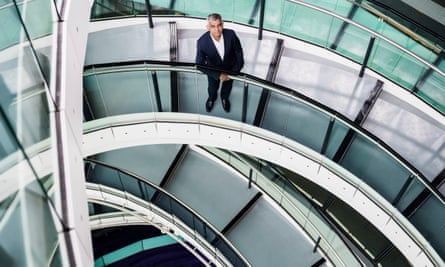
A couple of days earlier, I see a very different Khan – not the charismatic leader who shared the stage with Rahm Emanuel. This time, he’s at City Hall, the dramatic skewed bulb of a building that serves as the mayor’s home. Khan is being quizzed by the London Assembly, and he is curt, tetchy, resentful. Last month, a unanimous motion was passed to chastise Khan for failing to turn up to a meeting to discuss his transport strategy; the assembly’s Conservative leader Gareth Bacon said the mayor “had displayed a worrying level of contempt for the body that holds him to account”. This is the first Mayor’s Question Time since then.
Khan reads out his prepared answers in a mutter, drops his Hs and Ts, barely moving his mouth as he talks. He complains about the standard of questions from opposition party members, berating them for simply making statements.
He is challenged repeatedly on the transparency on which he prides himself. Conservative assembly member Susan Hall says, “The Harris report on terrorism made 127 recommendations. The mayor said he’d publish a formal response in due course. I’ve been told it’s 258 days since the report and no response has been published.”
Khan looks at her dismissively. “Is that a question?”
“Yes,” she says. “Do you think that’s acceptable?”
Khan: “Sorry, I didn’t hear the question.”
Hall: “Oh, do try and listen. Do you think it’s acceptable that it’s so long since the report was published and you haven’t published any response?”
Khan: “Yes.”
She tells him off for pulling a face at her. “I can make faces as well, Mr Mayor.”
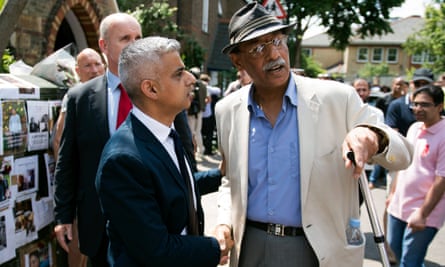
The morning’s session does not show Khan, or politics, in a good light. When the chair reminds him that pupils from a local school are in the audience to watch “democracy in action”, Khan looks embarrassed. Afterwards, he talks to the teenagers, telling them apologetically, “It’s not always like this.”
One of the things he is quizzed on is the “freeze” in transport fees, an important plank of his manifesto. While he has kept prices down, most Londoners will still pay more over his four-year term, because Khan has only limited powers over the cost. I ask if we’ve been sold a pup. “No,” he says instantly. “The manifesto said that I would freeze Transport for London fares.” It’s a subtle distinction, but he goes off on one, blaming the government and private contractors for raising prices, factors beyond his control. Which is perfectly true, but makes the manifesto promise even more disingenuous.
I read it to him: “Londoners will not pay a penny more for their travel in 2020 than they do today.” Was it not a clumsy promise at best?
“No! Because those aren’t the services I run.”
But the public doesn’t distinguish between the services run by you, the government or contractors: we just hear the promise.
“Come on, you’re an intelligent journalist! When I say to you, I don’t want to raise taxes, but central government raises income tax by 5%, you, as an intelligent journalist, will say, ‘Well, to be fair, Sadiq is in charge of council tax, not income tax.’ And similarly with fares.” True – and that’s why he shouldn’t have promised. But he won’t yield: as far as he is concerned, he has frozen his bit, and that is good enough. “No previous mayor has made that promise and done it. Promise made, promise delivered.”
A couple of days later, Khan is back at City Hall to welcome a delegation of ambassadors from the EU. They are here to discuss Brexit, and like Emanuel they want to express their solidarity with London. Khan is charm personified. He speaks respectfully, almost deferentially, with every H and T perfectly enunciated. The ambassadors express their sorrow at Britain leaving the EU “family”, and it is heartfelt, as is Khan’s regret. He points out that the EU flag is flying outside City Hall and wishes it would stay that way for ever. He tells them that he wants a post-EU London to continue doing business in the same way, but accepts this is probably a pipe dream. “It’s illogical to assume we can have a better deal or as good a deal with the EU outside the EU. It wouldn’t happen with a tennis club, or any club.”
Later, I ask if he thinks there is any way we could avoid leaving the EU. “Yes,” he says. His position could hardly be more different from Corbyn’s; he thinks Brexit is not a done deal. “I’m an optimist. For it to have credibility with the British public, there would have to be a Labour manifesto offer, because the public would say, not unreasonably, ‘Hold on a sec, we voted to leave and you’re now sticking two fingers up at us.’” The offer he proposes is surprisingly bold. “You’d have to spell out, in black and white, what we’d do if we won the general election. What could trump the referendum result is us having a manifesto offer saying, we would not leave the EU, or we would have a second referendum.”
Khan looks suddenly drained. Earlier today, he went to the funeral of five-year-old Isaac Paulos, who died in the Grenfell Tower fire, and says it has knocked the stuffing out of him. “Heartbreaking. Londoner of Ethiopian descent, lived on the 18th floor. Family are devastated.”
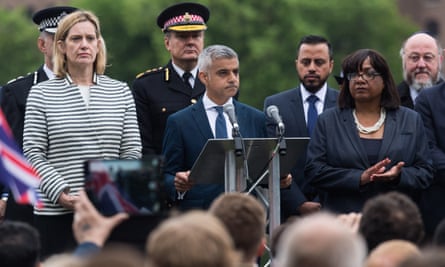
He has been scathing of the government and Kensington and Chelsea council’s response to the fire, in which at least 80 people died. There was a leadership vacuum immediately after the fire, and it has been suggested that Khan should have done more to fill it. Labour MP David Lammy was the most visible and vocal politician, alleging the fire amounted to “corporate manslaughter” of people who had the misfortune to be “working-class, poor and often reliant on the state for their housing and safety”.
Today, Khan says he doesn’t think he could have done more; he simply doesn’t have the powers. “One question to ask yourself is, am I doing this to make myself feel better, to look better on TV or whatever? And the second question is, how can I help the residents on the ground? I’m motivated by the latter, which is why I tried to work with the council. What I’m not going to do is showboat to the public. You speak to the residents. I didn’t celebrate Eid with my family because I was with the congregation who were praying for somebody who lost his wife and two children. What I can’t do is have a coup to take over the council. There is a different point, which is, should the mayor have more powers? And the answer is yes. That’s why I’ve asked for the mayor’s office to be legally represented at the public inquiry.”
He has been widely praised for acting with dignity and restraint in the aftermath of London’s recent terror attacks. I ask if he thinks it is harder to be a Muslim today than when he was growing up. “Yep,” he says instantly. “When I was growing up, we weren’t defined by our faith. In the 70s and 80s, you were either white or black, and I was considered black; then it moved on to Asian, and now it’s religion. Identity is very complex. We’ve got multiple identities: so I’m a father, a husband, a Muslim of Pakistani origin, a Liverpool fan, a Labour supporter...” He could go on.
He fears that all hate crimes are on the rise in Britain. “After the Brexit vote, words that we thought had been consigned to history were being used again. Somehow, people thought they now had permission to be abusive and racist. In 2017, in the most progressive city in the world, if you happen to go to a place of worship that is a synagogue or a Jewish faith school, you need protection. Speak to the management team at Finsbury Park mosque and they have seen a big increase in Islamophobic attacks. We can’t be complacent.”
One of the few people to have criticised Khan recently is Donald Trump. After the attacks on Borough Market and London Bridge, the US president tweeted: “At least 7 dead and 48 wounded in terror attack and Mayor of London says there is ‘no reason to be alarmed’!” Trump had got the context wrong: Khan had said the public should not be alarmed by the increased police presence on London’s streets. But Trump followed up with another tweet, that this was a “pathetic excuse” that the mainstream media “is working hard to sell”. Even his son Donald Trump Jr chipped in. In a recent interview with CNN, Khan said Britain should not roll out the red carpet for Trump’s planned visit, not when “his policies go against everything we stand for”.
Today, Khan tells me he’s baffled by Trump’s apparent fascination. “I’m a reluctant participant in this dialogue with Donald Trump, because I’m trying to be a full-time mayor doing my job, and I’m not sure what he and his son have against me, and why they are tweeting about me. We’re not schoolchildren. He’s the president of the United States, so I’m unclear what his beef is with me.”
Might his beef be that Khan is Muslim? “Well, if that’s the case, it says more about him than me. Look, it’s perfectly possible to be an American or a Brit and a Muslim. They are not mutually exclusive, and for anybody to think that – I can’t understand it, not for people who hold important power.” He sounds genuinely bewildered.
We are sitting in Khan’s office, where there is a huge Muhammad Ali poster on his wall. Khan comes from a boxing family; his brother Sid is a successful coach. He seems relaxed, despite the heightened security that has surrounded him since the terror attacks. For now, he cannot travel on the tube. The latest horror to afflict London is a spate of acid attacks. Khan has urged the government to adopt a zero-tolerance approach, suggesting anyone caught carrying acid should be sentenced as harshly as someone found guilty of carrying other offensive weapons.
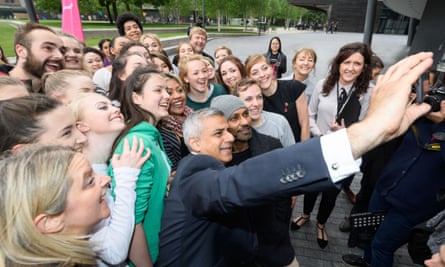
Meanwhile, Khan is looking forward to hosting the World Athletics and Para Athletics Championships: “The first time they have taken place in the same year in the same city, and the good news is, we’ve sold more tickets than all the previous World Para Athletics put together.” Khan is a 24/7 salesman, never missing a chance to plug his and London’s achievements.
A couple of years ago, he told me that his girls, now 16 and 17, thought he was uncool. Have they changed their minds now that he’s mayor? He laughs. “They don’t think I’m any cooler. I’ve got to admire Ed Balls, going on Strictly and his kids not ostracising him or asking for emancipation. My kids would never talk to me again. They aren’t embarrassed about me, but they don’t think I’m cool. They think other people’s dads are cool, though.” Who? “They love Ed Miliband. They think he’s a bae. That’s the word, isn’t it? He’s a Mili-bae! Did you hear him on the Jeremy Vine show? Very good. And he was great on The Last Leg. They love all that.”
We talk about Khan’s long-term plans. Surely the mayoralty is the perfect launch pad for a future Labour leadership bid? “I never have wanted to lead the Labour party and I don’t want to now,” he insists. Never? “On the record, off the record, you can speak to my wife, anybody – I don’t want to lead the Labour party. No.” Why? “Look, I think it’s really important to do a job you’re passionate about. I wanted to be a lawyer desperately, wanted to be an MP, wanted to be a minister, wanted to be mayor. I do not want to be prime minister one day, and I do not want to lead the Labour party one day. Honestly.”
He plans to focus on the job in hand and gradually accrue more powers. What are his chances of getting 50% of Londoners’ taxes by the time he finishes in office? He grins. “Look, after 24 years, I will have made lots of progress.” Twenty-four years! He genuinely fancies six terms as mayor of London? “Yes. And we’ll have a conversation then and see what I’ve managed to get.”
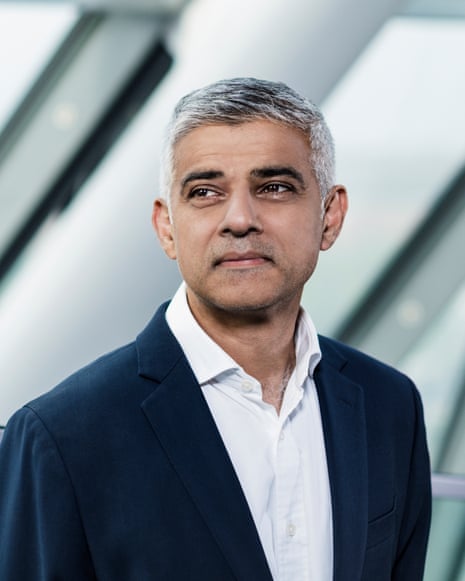
Comments (…)
Sign in or create your Guardian account to join the discussion